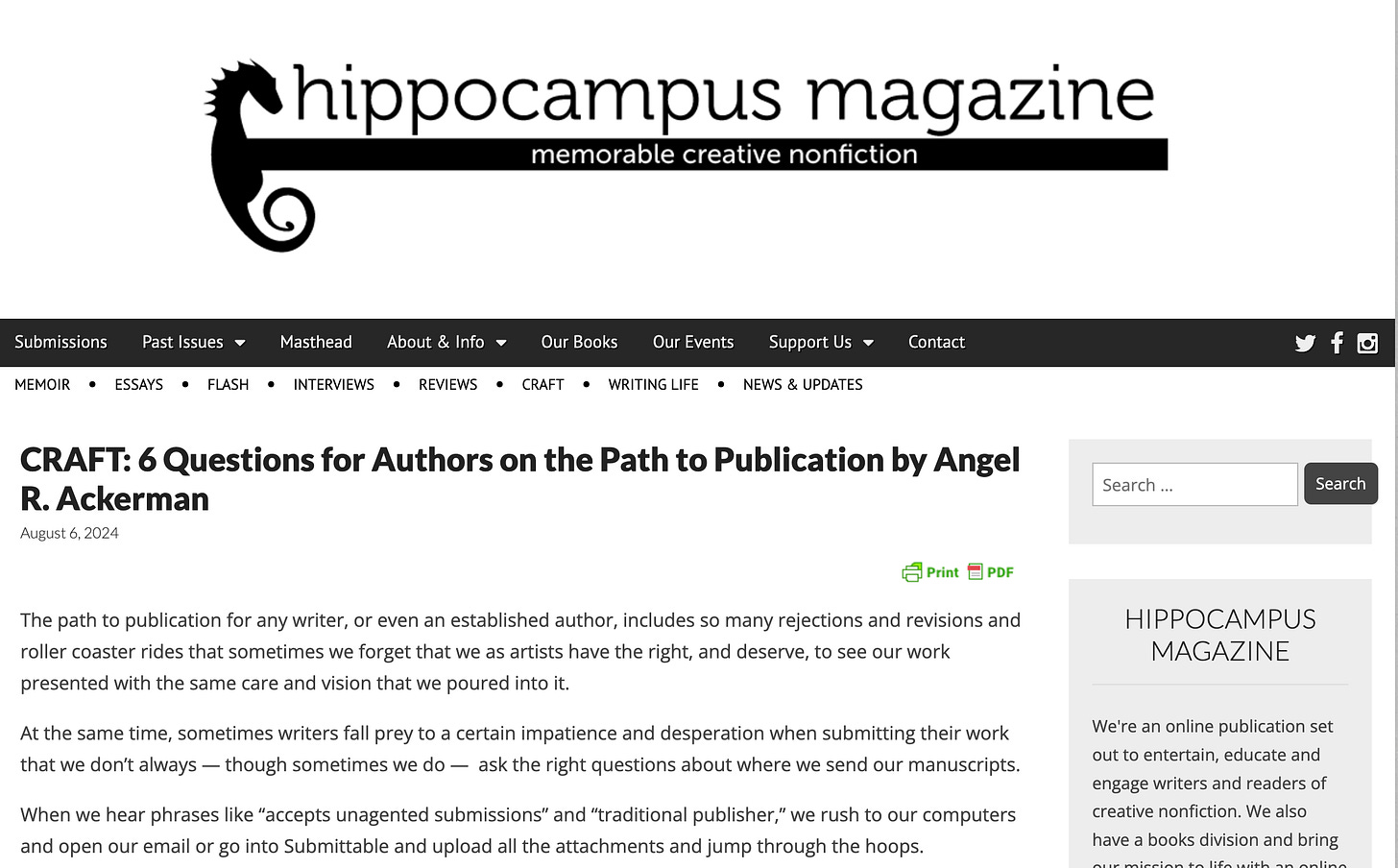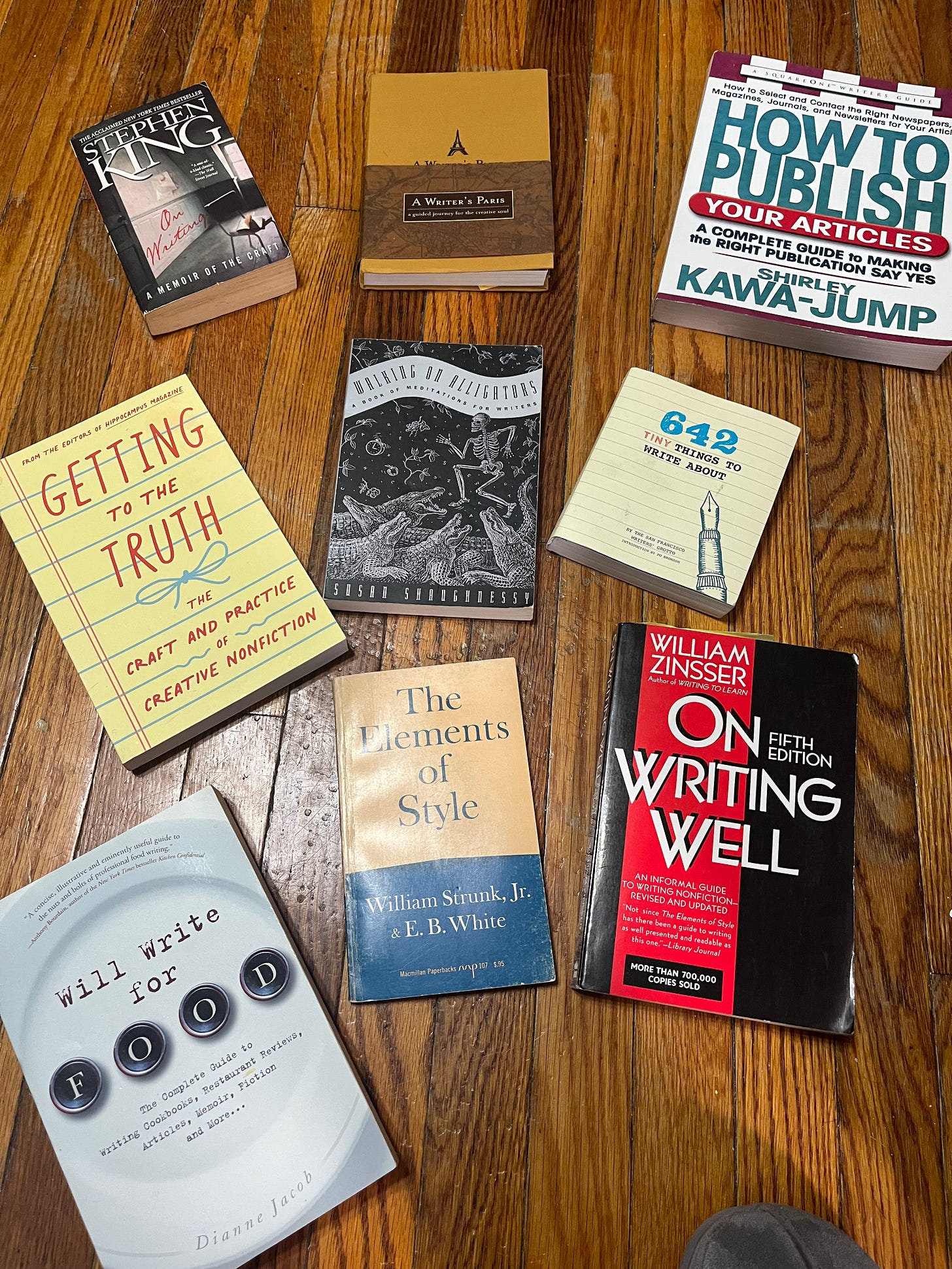Writers Resources
I recently had someone mention to me that its hard to find resources for beginning writers, or writers who don’t have experience seeking out opportunities. It’s a skill that writers and authors develop over time— finding resources.
I’ve started including more resources in my weekly newsletters and I’ll try to organize them here.
Educating yourself and finding professionals:
Websites. The oldie but goodie on this list is Writer Beware. I get a newsletter from Author Publish magazine that seems to offer a different genre every issue. Write or Die Magazine has cool emails with lots of workshop opportunities and hats that say… you guessed it… “Write or Die.” If you want to keep up with book deals and agent transactions and other industry news, subscribe to Publisher’s Marketplace. It is expensive ($25/month), and the free version will only give you a taste of what’s available. Many writers as they get started will subscribe for a month or two to do research and then cancel their subscription.
Podcasts. Spotify and other streaming services offer a wealth of free information. You can use podcasts to research topics, business and writing craft. If you look for my profile, I’m sharing my profile pic with a cat, you can find my curated lists on topics like “the business of writing,” “exclusive vs. wide,” “newsletters,” etc. Paid subscribers can read my past columns on podcasts here or peruse my podcasts for writers here.
Reedsy. Reedsy offers a catalog of professionals and a lot of free introductory workshops. I attend a lot of them— just to make see what other professionals are saying and doing.
Finding friends and support:
Facebook special interest groups. Now, as with anything on social media, don’t believe everything you read. I join a lot of these groups on lurk on 90% of them 99% of the time. It allows me to spot trends, see what other people are doing, and learn to spot opportunities versus scams.
Instagram/Tiktok. #Booktok and #Bookstagram can be fun ways to see what other people are doing, find inspiration, and discover others doing what you do without having to get too deeply invested.
Substack. I mean, you’re here already. Look around.
Organizations. You can find geographic groups of writers, groups based on genre and publishing organizations. Depending on whether you want to pursue writing as a hobby or a business, the right organization can help you work toward your goals.
Finding publications for articles, poems, essays and short works:
Submittable. Submittable is a database of artistic opportunities that can be sorted by genre, deadline, or even if it costs money. It allows you to find publications, track the status of your work, and compare entrance fees. Plus, the way the database works, it links to the publication’s web site so you can peruse it and decide if it’s a good fit.
Finding resources, conferences and academic info:
Hippocampus Magazine. Hippocampus has a “writing life” and “craft” section with new essays on writing, plus they host conferences and workshops. Here is their “Craft” section and you may see some work by me. [From their about page: “Hippocampus Magazine is an exclusively online publication set out to entertain, educate and engage writers and readers of creative nonfiction. Each issue features memoir excerpts, personal essays, reviews, interviews and craft articles.”]
Literary Hub. Literary Hub is a delightful resource and compilation of all types of literary articles and lists. Their daily newsletters will give you something to think about— or you can pop about their website and lose yourself.
Poets & Writers. Poets & Writers (pw.org) is a nonprofit organization with one of the densest magazines you’ll ever see. I used to say that new writers read Writer’s Digest, and then graduated to The Writer (www.writermag.com) before leveling up again to Poets & Writers.
To encourage you to write:
Oh Write! If you’re looking for online writing spaces that offer friendly competition or personalized writing spaces for just you and your critique partners— check out Oh Write! It’s a bare-bones notepad type word processor that tracks your word counts and shows you the word counts of other people in the room. So, if writing sprints motivate you, this could help the writing doldrums.
4theWords: This one is very similar to Oh Write! but provides a video-game-like format and offers the completion of quests to help keep you writing. Click here to learn more.
Tools:
NovelWriter: I heard about this FREE open source (is that what they call it?) software, NovelWriter, that mimics Scrivener. It might have been another recommendation from Jane Friedman’s Hot Sheet. If you write in scenes versus beginning to end, and you don’t have the cash for Scrivener or you want to try this alternative way to compose your book, check it out.
Author Care Kit. Prepared by the Society of Authors. This helpful free booklet “shows how the principles of good author care – transparency, support and inclusion, and respectful communication – can empower authors on their publication journey. It also suggests how to resolve any issues that arise.” Click here.
To learn more skills:
Digital art, social media posts and some basic design: Canva. It has its limits but it’s free. Adobe Express is the Adobe free software.
Book Design: Nathaniel Roy is a book designer with a Substack newsletter and he offers simple tips about how to put a book together. Read Part One of his “I can tell your book was self-published” here.
How to Fold a Zine: Check out this resource. You can also find YouTube videos but the static diagrams on the Library Kind website/blog help me do it at my own speed.
Louise Stingell’s Art Class: An online, self-directed sketching class for beginners. Now, I know writers sometimes relieve writer’s block by exercising other art forms or trying new things. This class is reasonably priced (about $70).
Writing References
Guidance for Writing Sex Scenes: Check out this compilation of quotes on LitHub from various writers about capturing the deed.
“Mentors” and People who Know the Business:
Sasha Black. Makes her full-time living writing and self-publishing the books she loves. She laughs a lot and works hard. She hosts The Rebel Author Podcast.
Jane Friedman. Sign up for her Electric Speed newsletter. It will keep you abreast of the technical trends and has a lot of practical advice. In November 2024, she released this updated list of the best digital tools for writers.
Rachael Herron. Author of my current favorite book, Hush Little Baby, and released her memoir, Unstuck, about moving to New Zealand in summer 2024. She has a podcast How do You Write? and offers online writing classes and support groups.
Tiffany Yates Martin. I met her at the Greater Lehigh Valley Writers Group Write Stuff Conference and she mentioned Rachael Herron so that automatically made her extra special. In addition, she has a sensible and personal approach to editing, sound advice and great energy. Visit her website here. She has lots of resources.
Joanna Penn. If you have any interest in keeping up with AI and other computer-based changes in the industry, listen to The Creative Penn podcast. She’s a self-published author with an ambitious rapid release schedule. Honestly, I don’t enjoy her books, but I can see why they sell. They are sparse with high action and complex, often historical, supernatural storylines.
Thomas Umstattd. He has been running a novel marketing podcast for more than a decade and he has some really clear advice of how to promote (and his dad is an accountant so he knows good financial stuff, too.) You can find transcripts of his podcasts on his website, Author Media. And if you want to tell me that you aren’t interested in promotion because you’re still writing, listening to Thomas’ advice might give you guidance on how to write your material so it’s easier to sell.
Writing and Publishing Books*
Books that inspire me:
Jacob, Dianne. Will Write for Food: Pursue Your Passion and Bring Home the Dough Writing Recipes, Cookbooks, Blogs, and More
Jenkins, Jerry B. Writing for the Soul: Instruction and Advice from an Extraordinary Writing Life
King, Stephen. On Writing: A Memoir of the Craft
Maisel, Eric. A Writer’s Paris: A Guided Journey for the Creative Soul
Shaughnessy, Susan. Walking on Alligators: A Book of Meditations for Writers
White, E.B. and William Strunk. The Elements of Style.
Zinsser, William. On Writing Well: The Classic Guide to Writing Nonfiction
Books on the Book Business:
Biel, Joe. People’s Guide to Publishing: Building a Successful, Meaningful Book Business from the Ground Up
Caine, Danny. How to Resist Amazon and Why: The Fight For Local Economies, Data Privacy, Fair Labor, Independent Bookstores and a People-Powered Future’
Cohen, Bryan. Self-Publishing with Amazon Ads: The Author’s Guide to Lower Costs, Higher Royalties, and Greater Peace of Mind.
Francis, Michael. Bestseller Blueprint: How to Write, Publish and Market a Book That Sells
Laties, Andy. Rebel Bookseller: Why Indie Businesses Represent Everything You Want To Fight For From Free Speech To Buying Local To Building Communities.
Recommended:
Cameron, Julia. The Artist's Way: 30th Anniversary Edition (recommended by Nancy Scott)
Goldberg, Natalie. Writing Down the Bones: Freeing the Writer Within (recommended by Nancy Scott)
Hayes, Gwen. Romancing the Beat: Story Structure for Romance Novels
Jump, Shirley. Writing Compelling Fiction: Master the Fundamentals of Unforgettable Stories
Lamott, Ann. Bird by Bird: Some Instructions on Writing and Life
Martin, Tiffany Yates. Intuitive Editing: A Creative & Personal Guide to Revising Your Writing AND The Intuitive Author: How to Grow & Sustain a Happier Writing Career
Books I want:
Carpenter, Nora Shalaway. Spinning Toward the Sun.
Herron, Rachael. Fast-Draft Your Memoir: The Workbook
Kenner, Corrine. Tarot for Writers.
Olsen, David, Robert W. Bly et al. Roget's Thesaurus of Words for Writers: Over 2,300 Emotive, Evocative, Descriptive Synonyms, Antonyms, and Related Terms Every Writer Should Know
Vonnegut, Kurt, and Suzanne McConnell. Pity the Reader: On Writing With Style.
*Paid subscribers can click here to read more detail on why I like these writing books.
**For more on Podcasts, paid subscribers have access to my curated podcast list here. Or find me on Spotify.




